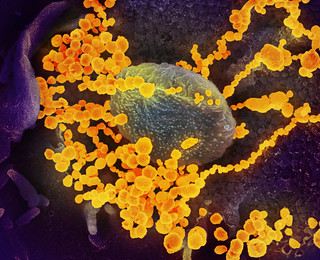SAN ANTONIO (May 29, 2020) — San Antonio patients with severe COVID-19 lung disease contributed to an international study published May 22 in the New England Journal of Medicine. The study outlined preliminary results of the recent Adaptive Covid-19 Treatment Trial, conducted partly in San Antonio, testing a new anti-viral drug called remdesivir.
Thomas Patterson, M.D., is principal investigator of a local study site involving UT Health San Antonio and its clinical partner, University Hospital.
According to the study authors, the drug improved recovery time and decreased the number of deaths among the sickest hospitalized COVID-19 patients. And because of the early positive results, the study’s data and monitoring committee asked the U.S. Food and Drug Administration for emergency authorization to discontinue the study early and offer the drug to all patients meeting criteria to receive it.
“These results are a great start in finding a treatment for COVID-19, but more studies are needed to find better treatments for COVID-19,” said Dr. Patterson, chief of the Division of Infectious Diseases in the Long School of Medicine at UT Health San Antonio. He leads the COVID-19 response team at University Hospital.
Study results
In the study, 1,063 patients were divided into two groups. One group received the anti-viral agent remdesivir while the other group received a placebo. Neither study participants nor physicians knew which medication was being administered to each patient.
The group receiving remdesivir had a median recovery time of 11 days compared to 15 days for the placebo group. The clinical trial also measured the death rate of participants after 14 days of beginning treatment. The death rate improved from 11.9% for the placebo group to 7.1% for those taking remdesivir.
Serious adverse events were experienced by 21.1% of patients in the remdesivir group, compared 27% the placebo group. The trial, sponsored by the National Institute of Allergy and Infectious Diseases, was ended early so that more patients can receive the new drug as the new standard of care through an emergency authorization of the U.S. Food and Drug Administration.
In early May, the NIAID began the second phase of the clinical trial comparing remdesivir by itself to remdesivir plus baricitinib. Baricitinib is an anti-inflammatory drug already approved by the FDA for rheumatoid arthritis. Patients are being enrolled at University Hospital.
# # #
The Long School of Medicine at The University of Texas Health Science Center at San Antonio is named for Texas philanthropists Joe R. and Teresa Lozano Long. The school is the largest educator of physicians in South Texas, many of whom remain in San Antonio and the region to practice medicine. The school teaches more than 900 students and trains 800 residents each year. As a beacon of multicultural sensitivity, the school annually exceeds the national medical school average of Hispanic students enrolled. The school’s clinical practice is the largest multidisciplinary medical group in South Texas with 850 physicians in more than 100 specialties. The school has a highly productive research enterprise where world leaders in Alzheimer’s disease, diabetes, cancer, aging, heart disease, kidney disease and many other fields are translating molecular discoveries into new therapies. The Long School of Medicine is home to a National Cancer Institute-designated cancer center known for prolific clinical trials and drug development programs, as well as a world-renowned center for aging and related diseases.
The University of Texas Health Science Center at San Antonio, also called UT Health San Antonio, is one of the country’s leading health sciences universities and is designated as a Hispanic-Serving Institution by the U.S. Department of Education. With missions of teaching, research, patient care and community engagement, its schools of medicine, nursing, dentistry, health professions and graduate biomedical sciences have graduated more than 37,000 alumni who are leading change, advancing their fields and renewing hope for patients and their families throughout South Texas and the world. To learn about the many ways “We make lives better®,” visit www.uthscsa.edu.
.


